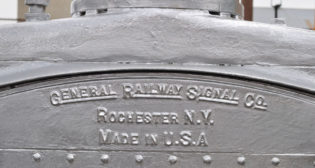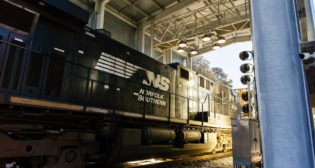
Transit Briefs: NYMTA, SacRT, Metrolink, WMATA, NJT, Houston Metro
Written by Marybeth Luczak, Executive Editor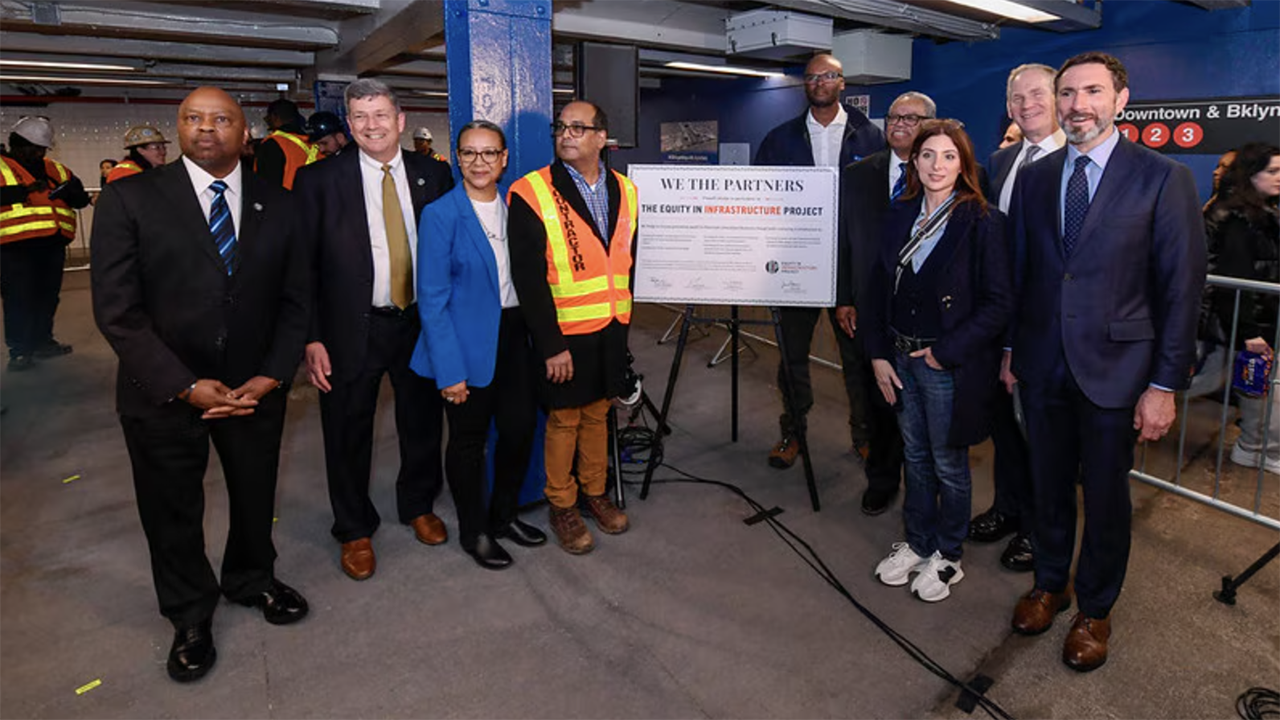
New York MTA officials were joined by “Equity in Infrastructure Project” (EIP) founders Phillip A. Washington and John D. Porcari, and Chicago Transit Authority President Dorval R. Carter, Jr., who also serves as EIP Chair, to sign the EIP pledge on March 7. (New York MTA Photograph).
New York Metropolitan Transportation Authority (MTA) signs the “Equity in Infrastructure Project” Pledge. Also, Sacramento Regional Transit District (SacRT) is developing mobility hubs at three light rail stations; Southern California’s Metrolink extends its fare-free pilot program for students; Washington Metropolitan Area Transit Authority (WMATA) marks improvements in ridership, customer satisfaction, public safety and fare collection while reducing expenses; New Jersey Transit (NJT) expands its partnership with Comcast Business; and Houston Metro (Metropolitan Transit Authority of Harris County, Tex.) selects Copperleaf to help improve asset management.
NY MTA
New York MTA on March 7 signed the “Equity in Infrastructure Project” Pledge, which it said furthered its commitment to inclusion when awarding construction project contracts.
MTA said the pledge affirms that it will:
- Ensure participation on at least $1 billion of work by Minority- and Women-owned (MWBE) or Disadvantaged Business Enterprise (DBE) firms every year.
- Award larger contracts to small businesses, as well as expand the pool of MW/DBE firms that MTA works with.
- Increase discretionary contracts for design and engineering MWBE firms by 20% over the next five years.
The Equity in Infrastructure Project was founded by Denver International Airport CEO Phillip A. Washington, former U.S. Deputy Secretary of Transportation John D. Porcari, and others in anticipation of the $1.2 trillion Infrastructure Investment and Jobs Act, and to advance President Joe Biden’s Justice40 Initiative and his executive order 13985 on Advancing Racial Equity and Support for Underserved Communities pledging to increase by 2026 the share of federal contracts that go to small and disadvantaged businesses. Its work is supported by Social and Environmental Entrepreneurs, Social Impact Fund, HNTB, STV, Anser Advisory, The Ewing Marion Kauffman Foundation, and The James Irvine Foundation.
Going back to 2020, MTA said it has surpassed the New York state MWBE goal of 30% participation every year, accounting for more than $2.5 billion in contracts during that time. Additionally, it said it ranks No. 1 of all New York state agencies and public authorities in dollars paid to MWBE firms. In 2023, MTA awarded more than $813.5 million in contracts across 500-plus MWBE firms accounting for approximately 37% of overall contracts. That is in addition to the $392.3 million paid to DBE firms, and $16.7 million to service-disabled veteran-owned small businesses, according to MTA, which said it also awarded nearly $70 million to small businesses through its Small Business Development Program.
MTA officials on March 7 were joined by the Equity in Infrastructure Project’s Phillip A. Washington and John D. Porcari, and Chicago Transit Authority President Dorval R. Carter Jr., who also serves as Equity in Infrastructure Project Chair, for a signing at the 14th Street 1 2 3 subway station. The station is currently undergoing upgrades to make the it accessible in accordance with the Americans with Disabilities Act. More than two dozen minority- or women-owned firms are working on this project, with more than $45 million in contracts to those firms, according to MTA.
“The MTA is proud to join fellow industry leaders for such an important initiative at such a crucial time,” MTA Chief Diversity and Inclusion Officer Lourdes Zapata said. “This pledge amplifies many of the efforts well under way on behalf of MWBDE and small businesses. Since 2019, our MWBE inclusion has improved every year, with a record 37% of all spending last year—the third consecutive year the MTA has exceeded the New York state MWBE goal. Our work with Disadvantaged Business Enterprise businesses resulted in an additional spend of over $390 million last year alone. Committed through the Equity in Infrastructure Pledge, the MTA will proudly represent New York state’s dedication to ensuring expanded opportunities to disadvantaged businesses on a national level.”
SacRT
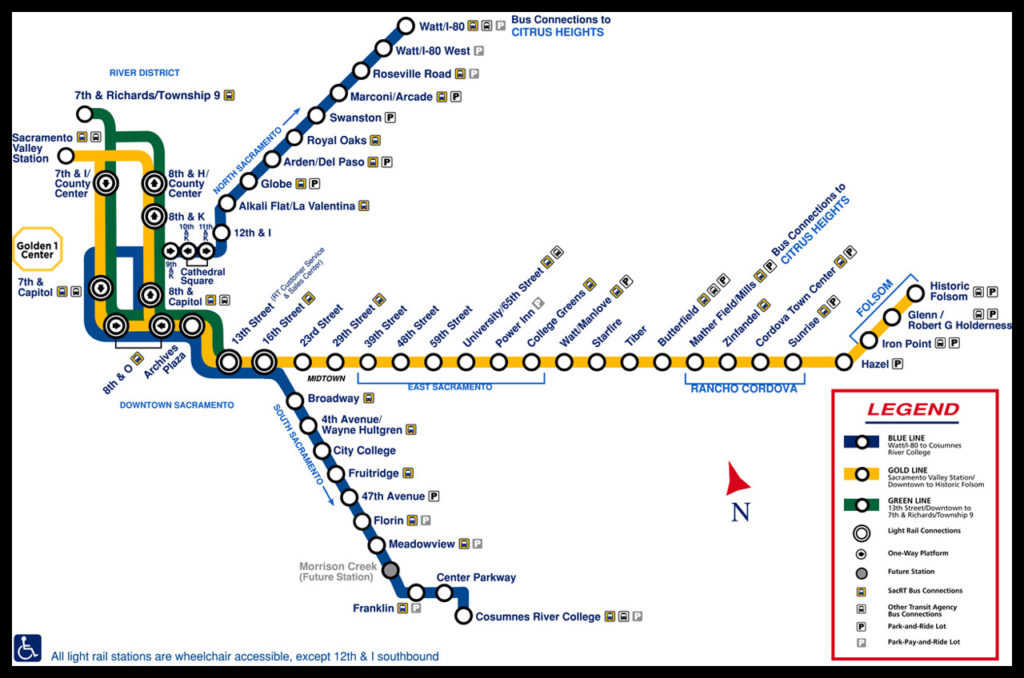
SacRT, in partnership with the Sacramento Metropolitan Air Quality Management District (Sac Metro Air District) and Sacramento Clean Cities Coalition (Clean Cities), is developing mobility hubs at three of its light rail stations: Marconi/Arcade Station, Globe Station, and La Valentina/Alkali Flat Station.
The mobility hubs will serve as “vital community hubs, strategically located within disadvantaged neighborhoods,” and offer transportation options aimed at reducing reliance on gas-powered and single-occupancy vehicles, SacRT said. Among those options: EV carshare, bike and scooter share services, EV charging stations, carpool/vanpool connections, and electric microtransit shuttles.
According to the transit agency, this initiative has been made possible through the receipt of $1.7 million in federal grant funding from the Joint Office of Energy and Transportation; the Sac Metro Air District may contribute up to $3 million for landscaping, lighting, and other infrastructure improvements, it added.
The mobility hubs at three SacRT stations represent the first phase of a larger mobility initiative led by the Sac Metro Air District, aiming to introduce up to 52 mobility hubs across the Sacramento region. According to SacRT, the California Air Resources Board’s (CARB) Sustainable Transportation Equity Program (STEP) granted $500,000 for the creation of a Mobility Hub Implementation Plan, which is being led by Civic Thread.
Over a two-year period, SacRT will work on collaborating with EV vendors, acquiring electric shuttles, and engaging in extensive community outreach to gather input on the features and services desired at each of its mobility hubs. SacRT said the project is anticipated to kick-off in the summer or fall of 2024.
“Many of our light rail stations and parking lots are well-suited for the mobility hub concept,” Sacramento County Supervisor and SacRT Board Chair Patrick Kennedy said. “When we link our bus and light rail systems to carshare programs, eBikes and Scooter rentals, we are providing people with end-to-end transportation and even more reasons to leave your car at home and take transit.”
“We are proud to support this pivotal first step toward establishing mobility hubs in our region,” said Alberto Ayala, Executive Director of the Sac Metro Air District. “As we have identified in our coordinated regional planning, these hubs will not only enhance transportation accessibility but also contribute significantly to our collective efforts for transportation electrification, reducing air and climate pollution, and advancing equity.”
“A disproportionate number of BIPOC and low-income communities across the region lack equitable access to transportation options that are affordable, sustainable and connect to essential destinations like grocery stores, schools, health care and employment centers,” said Kiara Reed, Executive Director of Civic Thread. “By centering community voices in the identification of mobility hubs and resulting amenities, we have a real opportunity to be intentional about health equity and advancing mobility options that meet the needs of communities who bear a disproportionate burden of transportation inequity.”
Metrolink

Metrolink, Southern California’s 538-route mile regional/commuter rail system, is extending its Student Adventure Pass program through the end of the 2023-24 school year. The pass program, which launched in October, allows anyone with a valid student ID to ride Metrolink trains for free.
Originally set to expire at the end of March, it is funded through a grant from the Low Carbon Transit Operations Program (LCTOP) administered by the California Department of Transportation (Caltrans). According to Metrolink, to support the three-month extension, its Board of Directors on Feb. 23 approved the transfer of available grant funding set to expire at the end of the current fiscal year from another LCTOP-supported program. Metrolink said it is now exploring additional funding sources to continue the program as a regular fixture beyond June 30.
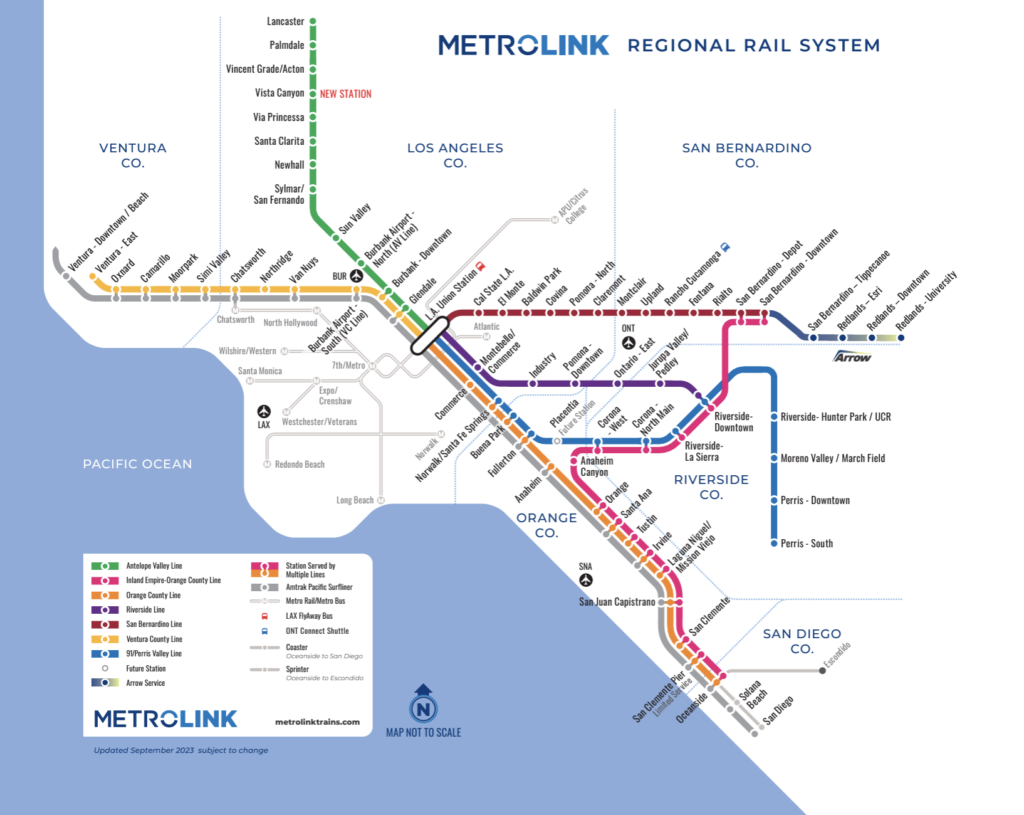
The Student Adventure Pass was designed to provide financial relief for students attending K-12, college and trade schools, while familiarizing them with the benefits of public transportation, Metrolink said. Since the program’s inception, more than 20,000 Southern California students have taken at least one trip using the Student Adventure Pass, with more than 247,000 daily passes activated on the mobile app or procured from a Metrolink ticket machine, according to Metrolink. Students from 403 schools across the regional/commuter rail system’s service area have used the Student Adventure Pass, it noted, and the share of student ridership from October through December of 2023 climbed 6% compared with the same period in 2022.
“I’m delighted by the remarkable success of the Student Adventure Pass program, empowering students to explore our communities while embracing sustainable transportation,” Metrolink CEO Darren Kettle said. “The direct feedback I have received from students and their enthusiasm for this program underscores the profound impact that removing barriers to transit can have. I thank the Metrolink Board of Directors for their continued support of our student riders and for reallocating funding to sustain the Student Adventure Pass through June.”
WMATA
WMATA on March 7 reported that a year into its strategic plan, it is seeing improvements in ridership, customer satisfaction, public safety and fare collection while expenses have been reduced.
According to the first annual report (see above) on the results of the Board of Directors’-approved strategic plan, “Your Metro, The Way Forward,” WMATA’s rail and bus ridership increased more than 4.5 million trips per month over the previous year, fueled by frequent, reliable, and safe service, the transit authority reported. Nearly half of Metrobus customers saw buses arrive every 12 minutes or less, and more than half of rail customers saw trains arrive every six minutes or less, on average, WMATA said.
The strategic plan also called for “creative measures” to reduce crime and improve customer perception of security, reported WMATA, which said crisis intervention specialists, partnerships with local law enforcement for enhanced station patrols, and more patrols onboard trains and buses have reduced Part I (violent) crimes by 14%.
“As reflected in the unprecedented levels of customer satisfaction, the investment in service frequency, reliability and security is helping people choose to come back to Metro [WMATA] and earning new customers,” WMATA Board Chair Paul C. Smedberg said. “We are able to make substantial customer and service improvements, all while lowering our costs and becoming more operationally efficient.”
While providing more frequent service, WMATA said it has reduced costs by $183 million “through one-time budget actions, newly identified recurring operating cost efficiencies and salary/wage freezes.” The transit authority said it has also sized trains to match ridership demand, launching its first six-car trains on its newest railcar fleet. Financially, WMATA said it has “outperformed expense projections with tight management controls, had a clean independent audit for the ninth straight year, and maintained its AA bond rating, keeping the cost of borrowing in check.” At the end of the second quarter, WMATA said it is tracking under its projected operating budget.
According to the transit authority, its efforts to install new fare gates, as part of a program of enhanced enforcement, have reduced fare evasion in targeted stations by 70%.
The annual report also showed that WMATA’s emissions reduction saved the equivalent of driving about 200 million miles in an average gasoline-powered car.
WMATA said that in tandem with the annual report, the Board is discussing with staff action plans “that deliver a road map for autonomous trains, zero-emissions buses, and sweeping digitization to improve productivity and compliance.”
NJT
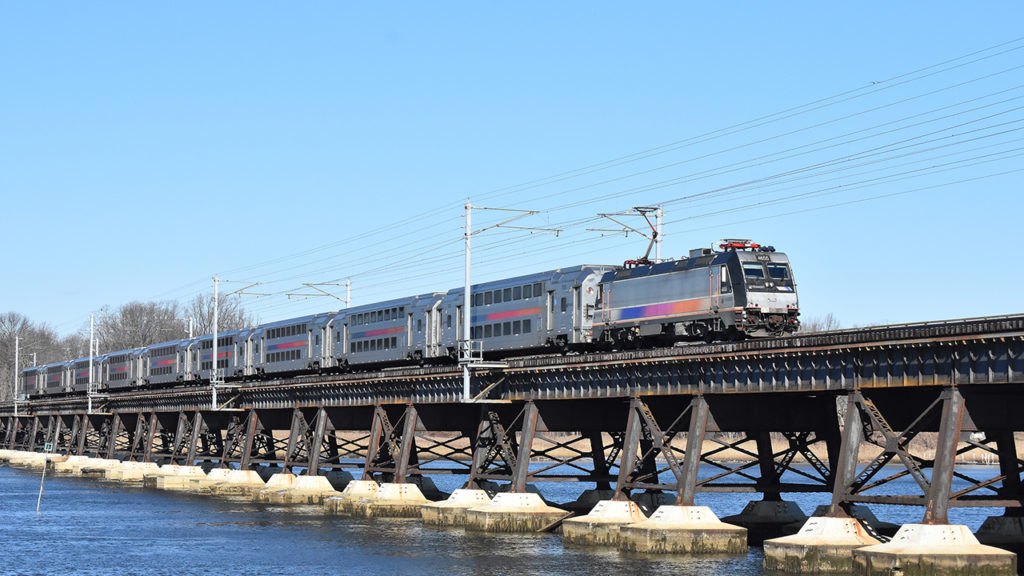
Comcast Business on March 7 reported it is expanding its partnership with NJT to bolster network infrastructure. “The transit provider identified a need for improved connectivity and redundancy, as a single point of failure could impact its operations,” Comcast Business said. “It also required a network system that could power quality communication and improve the experience for riders [across New Jersey and in parts of New York and Pennsylvania]. Significant bandwidth is critical to support various communication methods, including network-dependent audio communication systems used to communicate between operators, other vital staff and customers, along with public Wi-Fi, digital displays and signage communicating departure times, and more.”
“I have always prioritized innovative solutions to enhance operational efficiency and customer experiences,” said Bilal Khan, Chief Technology Officer of Infrastructure for NJT, the third-largest provider of bus, rail, and light rail transit by ridership in the United States, providing nearly 240 million passenger trips each year, with roughly one million riders per day. “Providing high-performance Ethernet and Internet solutions is a testament to our commitment to leveraging advanced technology. This project helps bolsters our network and aligns perfectly with our forward-looking vision to revolutionize public transit.”
Houston Metro
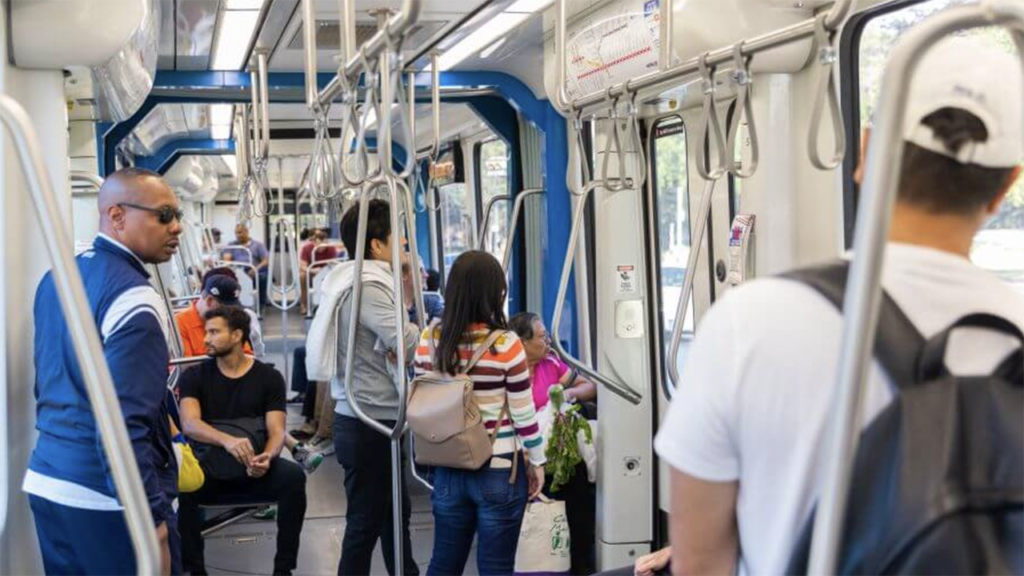
Copperleaf® Technologies Inc. on March 7 reported that Houston Metro has selected its decision-analytics technology, Copperleaf Portfolio™ “to establish a more consistent, data-driven process to assess and prioritize investments in the State of Good Repair backlog by adopting best practices in modeling, risk assessment, and project valuation.” Metro—which operates bus, light rail, bus rapid transit, HOV and HOT lanes, and paratransit service in the city as well as most of Harris County—will use Portfolio™ “to evaluate all projects on a common scale, incorporate all drivers of project value, develop risk mitigation scenarios, and create high-value plans that consider funding and staffing resource limitations,” according to the supplier. Additionally, Metro will have the ability to adapt plans to changing business and financial conditions and ensure investments are aligned with its long-term mission and strategy.
The Copperleaf Portfolio™ is scheduled to launch in approximately three months.
Metro’s Transit Asset Management (TAM) group was established in 2017 to comply with the Federal Transit Administration’s TAM Rule and provide decision support to prioritize and justify capital investment needs, according to Copperleaf. “As trends and requirements in the North American transit asset management landscape have evolved to incorporate new drivers of value, such as risk, resilience, and equity, legacy tools are increasingly unable to meet the complex investment prioritization needs of many medium to large transit providers,” the company reported. “In late 2023, Metro recognized that transitioning from a manual Excel-based process to an Asset Investment Planning (AIP) solution could improve its ability to create transparent, defensible capital plans, address its State of Good Repair backlog, and adapt quickly to changing financial and operational conditions.”
